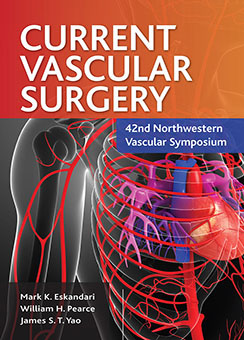
Now accepting pre-orders for February 2021 publication.
Applied Physiology in Noninvasive Mechanical Ventilation: Key Practical Insights explains the implications of lung physiology — lung mechanics, gas exchange — on noninvasive mechanical ventilation under a variety of clinical conditions.
Focused on understanding how lung physiology interacts with noninvasive ventilation, this book will be an excellent reference for pulmonologists, anesthesiologists, critical care physicians, and emergency medicine physicians in their treatment and care of patients with acute and chronic respiratory disorders.
The book’s 67 chapters are divided into six sections that take the reader through these topics:
(1) pulmonary physiology as it interacts with noninvasive mechanical ventilation (NIV), and physiology of the respiratory muscles, structure and function of lung mechanics;
(2) the interaction of lung physiology with positive pressure, extrapulmonary response (hemodynamic-ventilation interactions);
(3) gas exchange and applied physiology during NIV;
(4) interactions of lung mechanics with NIV in terms of pressure, volume, flow, monitoring, testing of pulmonary function;
(5) NIV technology: interface and mechanical ventilators, patient-ventilator synchrony, ventilatory modes, monitoring patient-ventilator interaction;
(6) physiopathologic perspective on clinical applications of NIV.

Pre-order this February 2021 publication.
Head and Neck Cancer Care in a Pandemic: Prioritizing Safe Care is an up-to-the-moment, comprehensive reference for addressing the complex problems inherent in delivering optimal cancer treatment during a pandemic. Written during the crisis, a major motivation for its publication is the simple fact that delaying treatments for cancers is frequently not an option.
This outstanding volume is unique for its inclusive authorship: contributors represent the heads of renowned departments in leading institutions, residents, fellows, and medical students on the front lines of the pandemic. While providing vital and time-sensitive cancer patient care, the authors have documented lessons learned battling serious diseases and co-morbidities during the COVID-19 emergency.
In addition to an emphasis on the surgical issues of specific diseases, Head and Neck Cancer Care in a Pandemic looks at multidisciplinary patient management, education, social issues impact, and general considerations such as telemedicine and protective equipment.
The editors have arranged the text in six sections:
- General Considerations
- Patient Management Consideration
- Subsite-Specific Considerations (Mucosal)
- Subsite-Specific Considerations (Nonmucosal)
- Education in the COVID-19 Era
- Social Issues in the COVID-19 Era
Clinicians, investigators, and students will discover this rare achievement in medical textbooks is a valuable resource in the practice of oncologic care in the COVD-19 era.

Now taking pre-publication orders for February 2021 publication.
The forthcoming second edition of Surgery of the Cerebellopontine Angle presents a comprehensive guide to neurosurgical, neuroendovascular and neuroradiological developments in the treatment of conditions and diseases in the cerebellopontine angle (CPA).
Drs. Bambakidis, Megerian, and Spetzler give CPA—the fragile area of the skull base that Harvey Cushing famously described as “the bloody angle”—a multidisciplinary treatment, describing proven and effective clinical approaches to craniotomy, endovascular neurosurgery, and interventional neuroradiology treatment options. Images courtesy of the renowned Barrow Neurological Institute illustrate the contributions from expert specialists in neurosurgery, neurotology, neuroradiology, otolaryngology—head and neck surgery, and endovascular surgery.
Topics covered include intracranial neoplasms such as vestibular schwannoma, foramen magnum menigioma, and temporal bone lesions, and approaches such as endoscopic, retrosigmoid, and translabyrinthine. Readers will find case studies in the surgical management of diseases of the CPA presented in animation and videos accessed with a unique key code.
The book is arranged in five sections:
Part I. Foundations for Treatment
Part II. Surgical Approaches
Part III. Acoustic Neuromas
Part IV. Nonschwannomatous Lesions of the CPA
Part V. Cases and Approaches (Animations and Videos atlas)
Appendix: Anatomic Dissection
In Current Vascular Surgery: 42nd Northwestern Vascular Symposium we have brought together 50 national experts from the 2017 symposium to address timely topics and controversies in vascular and endovascular surgery. As has been the tradition, presentations cover the full spectrum of vascular surgery, including changes in management of extracranial cerebrovascular disease, new treatment options for lower extremity arterial occlusive disease, hemodialysis access, improvements in techniques for complex venous disease, and developments in aortic stent graft repair in the chest and abdomen.
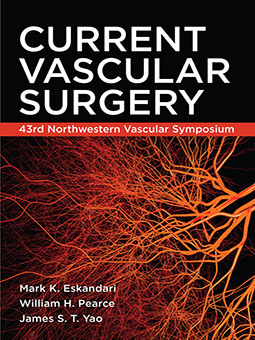
Current Vascular Surgery: 43rd Northwestern Vascular Symposium addresses contemporary topics and controversies in vascular and endovascular surgery, providing a comprehensive overview of the field’s recent evolution. This volume is the result of the 43rd Annual Vascular Symposium sponsored by the Division of Vascular Surgery, Feinberg School of Medicine, Northwestern University. The symposium was held in Chicago on December 6–8, 2018 at the InterContinental Hotel on Chicago’s Magnificent Mile. The contributing authors were selected on the basis of recent peer-reviewed publications and national societal presentations; all are recognized leaders in their disciplines.
Current Vascular Surgery: 43rd Northwestern Vascular Symposium provides a comprehensive analysis of the current management of vascular disease as it relates to treatment of extracranial cerebrovascular and supra-aortic trunk disease, new approaches to lower extremity arterial and venous problems, and recent cutting-edge developments in open and endovascular approaches to treat aortic and visceral arterial disease, as well as novel techniques for hemodialysis access, complex venous problems, and upper extremity disorders.
Each of the 54 chapters has as its basis a presentation by an internationally recognized expert at the 43rd Annual Vascular Symposium but includes more in-depth details than is possible in a symposium presentation.
The annual symposium on vascular surgery, sponsored by the Division of Vascular Surgery at the Northwestern University Feinberg School of Medicine, addresses contemporary topics and controversies in vascular and endovascular surgery. The symposium brings together leading surgeons to address timely topics and controversies in vascular and endovascular surgery.
Presentations at the symposium cover the full spectrum of vascular surgery, including changes in management of extracranial cerebrovascular disease, new treatment options for lower extremity arterial occlusive disease, hemodialysis access, improvements in techniques for complex venous disease, and developments in aortic stent graft repair in the chest and abdomen.
The Modern Trends in Vascular Surgery series is a topical compilation of the standout presentations from the most recent three symposia.
Purchase the entire 5-volume series:
Lower Extremity Vascular Disorders
Upper Extremity and Vascular Access
Complex Arterial and Venous Problems
Diseases of the Aorta
Carotid and Supra-Aortic Trunk Disorders
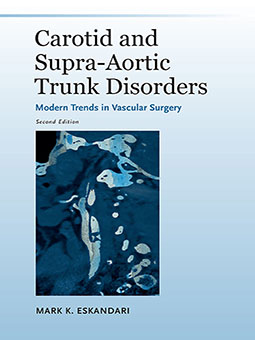
Carotid and Supra-Aortic Trunk Disorders, a volume in the Modern Trends in Vascular Surgery series, will be a valuable addition to any vascular surgeon’s reference library. Covered in this book is an overview of some of the more controversial topics of extra-cranial carotid disease such as the cognitive impact of carotid disease, management in the elderly population, impact of a contralateral occlusion, timing of intervention after an acute stroke, management of asymptomatic restenosis, and use of shunts.
Arranged in five sections and 17 chapters – extracranial carotid disease, extracranial carotid interventions, external beam radiation and restenosis, complex carotid and subclavian artery disease, and a historical reflection on the field by Dr. James S. T. Yao – readers will find technical tips on treating subclavian artery aneurysms and carotid body tumors, performing extra-anatomic supra-aortic trunk bypass, and a review of the durability and use of embolic protection devices.
The annual symposium on vascular surgery, sponsored by the Division of Vascular Surgery at the Northwestern University Feinberg School of Medicine, addresses contemporary topics and controversies in vascular and endovascular surgery. The symposium brings together leading surgeons to address timely topics and controversies in vascular and endovascular surgery. Presentations at the symposium cover the full spectrum of vascular surgery, including changes in management of extracranial cerebrovascular disease, new treatment options for lower extremity arterial occlusive disease, hemodialysis access, improvements in techniques for complex venous disease, and developments in aortic stent graft repair in the chest and abdomen. The Modern Trends in Vascular Surgery series is a topical compilation of the standout presentations from the most recent three symposia.
Other titles in the Modern Trends in Vascular Surgery series:
Lower Extremity Vascular Disorders (Arterial and Venous)
Upper Extremity and Vascular Access
Complex Arterial and Venous Problems
Diseases of the Aorta
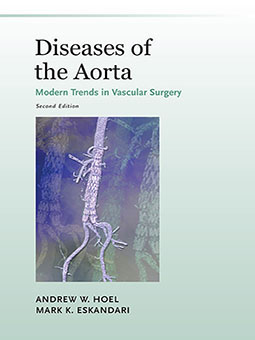
Diseases of the Aorta, a volume in the Modern Trends in Vascular Surgery series, is a compilation of chapters that pertain to the treatment of aortic disease.
Sections are organized by theme rather than by anatomic site. (1) A broad historical perspective on the symposium; (2) assessment of aneurysm repair in the endovascular era; (3) impact of patient factors as key drivers of procedural outcomes in the treatment of aortic disease; (4) critical elements of anatomic factors in aortic and iliac disease; (5) innovative techniques that facilitate treatment of aortic disease; (6) key challenges surgeons face in the endovascular treatment of aortic disease.
The annual symposium on vascular surgery, sponsored by the Division of Vascular Surgery at the Northwestern University Feinberg School of Medicine, addresses contemporary topics and controversies in vascular and endovascular surgery. The symposium brings together leading surgeons to address timely topics and controversies in vascular and endovascular surgery. Presentations at the symposium cover the full spectrum of vascular surgery, including changes in management of extracranial cerebrovascular disease, new treatment options for lower extremity arterial occlusive disease, hemodialysis access, improvements in techniques for complex venous disease, and developments in aortic stent graft repair in the chest and abdomen. The Modern Trends in Vascular Surgery series is a topical compilation of the standout presentations from the most recent three symposia.
Other titles in the Modern Trends in Vascular Surgery series:
Lower Extremity Vascular Disorders (Arterial and Venous)
Upper Extremity and Vascular Access
Complex Arterial and Venous Problems
Carotid and Supra-Aortic Trunk Disorders
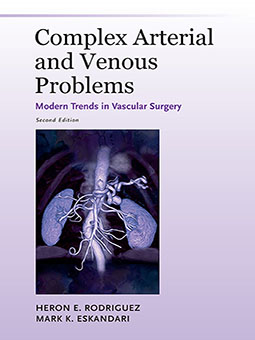
Complex Arterial and Venous Problems, a volume in the Modern Trends in Vascular Surgery series, features chapters on the management of complex problems affecting the visceral arteries such as dissections, aneurysms, and occlusive disease. Arranged in six sections and 25 chapters, topics include disorders of the mesenteric vessels, aneurysms, and complex aortic problems. A section explores vascular interventions during primary, nonvascular procedures.
To complete this work, we have included chapters on complex aortic, extremity, and venous issues not covered in the other books included in this series.
The annual symposium on vascular surgery, sponsored by the Division of Vascular Surgery at the Northwestern University Feinberg School of Medicine, addresses contemporary topics and controversies in vascular and endovascular surgery. The symposium brings together leading surgeons to address timely topics and controversies in vascular and endovascular surgery. Presentations at the symposium cover the full spectrum of vascular surgery, including changes in management of extracranial cerebrovascular disease, new treatment options for lower extremity arterial occlusive disease, hemodialysis access, improvements in techniques for complex venous disease, and developments in aortic stent graft repair in the chest and abdomen. The Modern Trends in Vascular Surgery series is a topical compilation of the standout presentations from the most recent three symposia.
Other title in the Modern Trends in Vascular Surgery series:
Lower Extremity Vascular Disorders (Arterial and Venous)
Upper Extremity and Vascular Access
Diseases of the Aorta
Carotid and Supra-Aortic Trunk Disorders
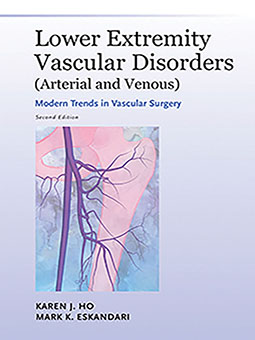
Lower Extremity Vascular Disorders (Arterial and Venous), a volume in the Modern Trends in Vascular Surgery series, represents a compilation of topics related to lower extremity vascular disorders. It is divided into four sections:
(1) Northwestern Vascular Surgery Annual Symposium reflects on its history; (2) Arterial Disease covers exercise therapy for claudication, open and percutaneous common femoral artery interventions for occlusive disease, challenges to and advancements in stent technology, vein harvest and bypass surgery, arterial injuries after knee trauma, and iliac endofibrosis; (3) Venous Disease addresses abdominal and pelvic venous compression syndromes, varicose vein management, acute lower extremity deep venous thrombosis, and approaches to venous ulcers; (4) Wounds consists of one chapter covering advances in wound management.
The annual symposium on vascular surgery, sponsored by the Division of Vascular Surgery at the Northwestern University Feinberg School of Medicine, addresses contemporary topics and controversies in vascular and endovascular surgery. Presentations at the symposium cover the full spectrum of vascular surgery, including changes in management of extracranial cerebrovascular disease, new treatment options for lower extremity arterial occlusive disease, hemodialysis access, improvements in techniques for complex venous disease, and developments in aortic stent graft repair in the chest and abdomen. The Modern Trends in Vascular Surgery series is a topical compilation of the standout presentations from the most recent three symposia.
Upper Extremity and Vascular Access
Complex Arterial and Venous Problems
Diseases of the Aorta
Carotid and Supra-Aortic Trunk Disorders





